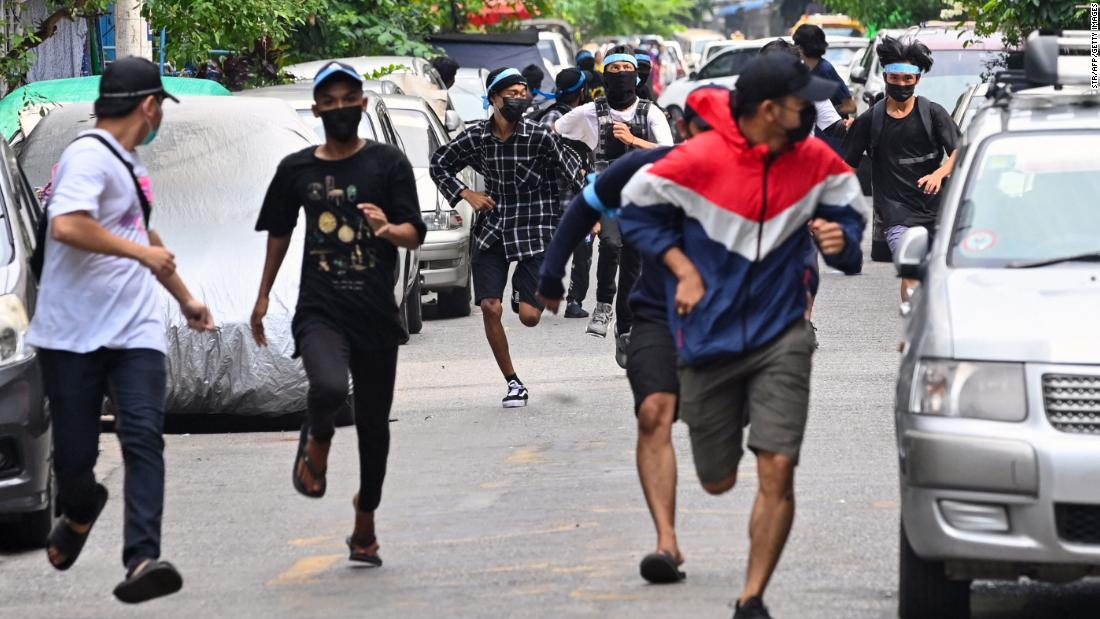
A Facebook post by the Bago University Students’ Union said the military had charged 120,000 kyat families in Myanmar ($ 85) with recovering the bodies of dead relatives. Bachelet said there were also reports that the army “prevented medical personnel from helping the wounded.”
“There are clear echoes of Syria in 2011. And there we have seen peaceful protests met with unnecessary and clearly disproportionate forces,” she said. “The state’s brutal and persistent repression of its own people has led to the unification of weapons by some individuals, followed by a downward spiral of violence that is spreading rapidly across the country.”
Bachelet said countries “should not allow the repetition of past deadly mistakes in Syria and elsewhere.”
More than 700 people, including children, have died since the military overthrew Myanmar’s elected government in a February 1 coup, according to AAPP. Since then, the junta’s security forces of police, soldiers and elite counter-insurgency troops have engaged in a systematic crackdown on unarmed and peaceful protesters, detaining about 3,000 people, often in night raids, and forcing activists to hide.
Bachelet’s statement came as anti-coup activists called for a week of protests to coincide with the annual New Year’s holiday, known as Thingyan. Tuesday marked the first day of the five-day holiday, which is usually celebrated with prayers, ritual cleansing of Buddha images in temples, and jubilant public water fights in the streets.
Instead of the traditional water festivities and dance performances, opponents of the coup have said they will not celebrate this year and are angry with the generals who have seized the country through modest displays of defiance and small protests, according to Reuters.
“We are not celebrating Myanmar Thingyan this year because more than 700 of our innocent and brave souls have been killed,” a Twitter user named Shwe Ei told Reuters.
In several cities, protesters took to the streets holding traditional Thingyan pots containing seven flowers and twigs that are displayed at this time of year. Many people painted the greeting of the protester with three fingers on the pot. Others broadcast messages such as “Save Myanmar” in silent opposition shows against the army, according to Reuters.
However, the violence continued in some parts. In the northern city of Tamu in the Sagaing region, on Myanmar’s border with India, junta forces raided barricades and fired on people’s homes, AAPP reported. A man and a woman were shot by soldiers while delivering milk in the city, AAPP and several other local media reported.
CNN contacted the Myanmar army for comments.
Daily internet restrictions on wireless data and broadband services have meant that information has slowed to a release, especially in areas far from big cities.
In his statement, Bachelet said that “the vast majority of people” were left “without access to vital sources of information and communication.”
“Mass arrests have forced hundreds of people into hiding, and reports suggest that many journalists, civil society activists, celebrities and other public figures are wanted, many simply because of the dissent they have expressed online.” she said.
On Tuesday, Myanmar’s news channel, Myawaddy TV, aired photos of 20 health workers who it said were accused of incitement because they were associated with the Civil Disobedience Anti-Coup Movement. Since the beginning of the coup, doctors have been leading protests against the military government, and junta forces have targeted health workers, ambulances and occupied dozens of hospitals.
In the past few weeks, the junta has aired a “search list” on the 8 p.m. show, featuring photos of accused stars, journalists, actors and artists in accordance with section 505 (a) of the Criminal Code.
The law makes a crime “prevent, disturb, harm the motivation, discipline, health, behavior of” government employees and military personnel “and cause them” hatred, disobedience or disloyalty “to the government or army.
The coup halted Myanmar’s gradual opening to democracy, which has seen 10 years of reform after half a century of military rule. Along with street protests and acts of resistance against the junta, thousands of striking workers and civil servants are participating in the Civil Disobedience Movement, which is disrupting the economy.
“The country’s economy, education and health infrastructure have been brought to the brink of collapse, leaving millions of people in Myanmar without livelihoods, basic services and, increasingly, food security,” Bachelet said.
She called on influential countries to stop supplying weapons and finance to Myanmar’s army to stop “committing serious human rights violations and possible crimes against humanity.”
“Convictions and limited targeted sanctions are clearly not enough,” she said.
Angus Watson and CNN’s Reuters contributed to the reporting.